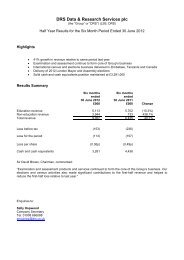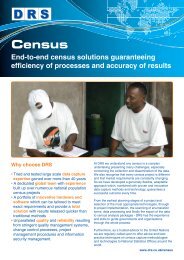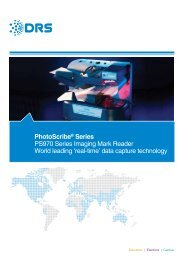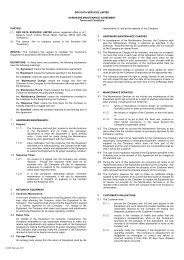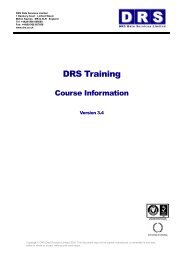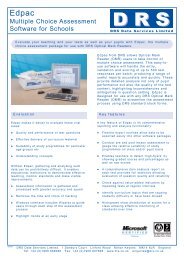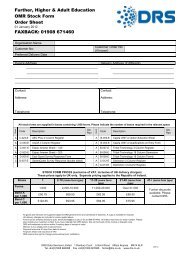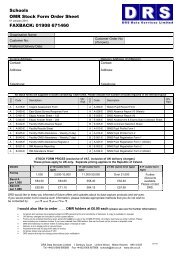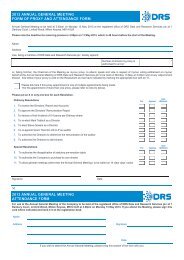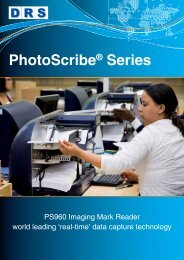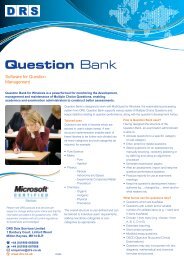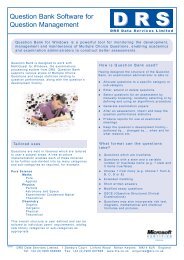MultiQuest - the Multiple Choice Assessment Package - DRS
MultiQuest - the Multiple Choice Assessment Package - DRS
MultiQuest - the Multiple Choice Assessment Package - DRS
You also want an ePaper? Increase the reach of your titles
YUMPU automatically turns print PDFs into web optimized ePapers that Google loves.
<strong>MultiQuest</strong> - <strong>the</strong> <strong>Multiple</strong> <strong>Choice</strong> <strong>Assessment</strong> <strong>Package</strong><br />
Report of <strong>MultiQuest</strong> for Windows results<br />
Point Biserial Coefficient<br />
Measures how well <strong>the</strong><br />
question predicts a pupil’s<br />
performance in <strong>the</strong> whole<br />
assessment. Its value yes<br />
between plus and minus 1.<br />
<strong>the</strong> higher <strong>the</strong> value, <strong>the</strong><br />
better <strong>the</strong> correlation between<br />
<strong>the</strong> question and assessment<br />
overall. In this example,<br />
questions 1 & 2 have an<br />
acceptable Point Biserial<br />
Coefficient, but question 3<br />
needs analysis.<br />
KR20:0.226<br />
KR20 (Kuder-<br />
Richardson’s formula)<br />
An estimate of <strong>the</strong><br />
overall reliability of <strong>the</strong><br />
assessment. It lies in<br />
<strong>the</strong> range zero to<br />
one. The higher <strong>the</strong><br />
value, <strong>the</strong> better <strong>the</strong><br />
reliability of <strong>the</strong><br />
assessment. In this<br />
example, <strong>the</strong> low value<br />
of 0.226 indicates that<br />
<strong>the</strong>re are probably<br />
several questions<br />
whose “Point Biserial<br />
Coefficients’ require<br />
investigation.<br />
33% item discrimination<br />
A measure of <strong>the</strong> correlation<br />
between a pupil’s score in this<br />
question and <strong>the</strong>ir score in <strong>the</strong><br />
entire asessment. It lies<br />
between plus and minus 1. The<br />
higher <strong>the</strong> value, <strong>the</strong> better<br />
<strong>the</strong> correlation. In this<br />
example, question 3 exhibits<br />
an undersirable lack of such<br />
correlation.<br />
Third analysis table<br />
Shows <strong>the</strong> percentage of all<br />
pupils and those in <strong>the</strong> upper<br />
and lower thirds who answered<br />
<strong>the</strong> question<br />
correctly, incorrectly, or left it<br />
unresolved.<br />
Example of <strong>MultiQuest</strong> results<br />
Twenty percentiles<br />
histogram<br />
These show <strong>the</strong><br />
proportion of pupils in<br />
each of <strong>the</strong> five score<br />
bands who answered<br />
<strong>the</strong> question correctly.<br />
The histogram for<br />
question 1 shows<br />
almost an ideal<br />
distribution, that for<br />
question 2 slightly less<br />
than ideal, but<br />
for question 3 <strong>the</strong><br />
indication is that less<br />
able pupils have done<br />
better in <strong>the</strong> question<br />
than higher scoring<br />
pupils.<br />
<strong>DRS</strong> Data Services Limited is part of <strong>the</strong> <strong>DRS</strong> Group.<br />
Please note <strong>DRS</strong> products and services are subject to change without notice and that <strong>the</strong><br />
information provided is for guidance only. <strong>DRS</strong> equipment complies with all<br />
current regulations. All trademarks acknowledged.<br />
V0407<br />
<strong>DRS</strong> Data Services Limited 1 Danbury Court Linford Wood Milton Keynes MK14 6LR England<br />
Tel: +44(0)1908 666088 Fax: +44(0)1908 607668 www.drs.co.uk enquiries@drs.co.uk



